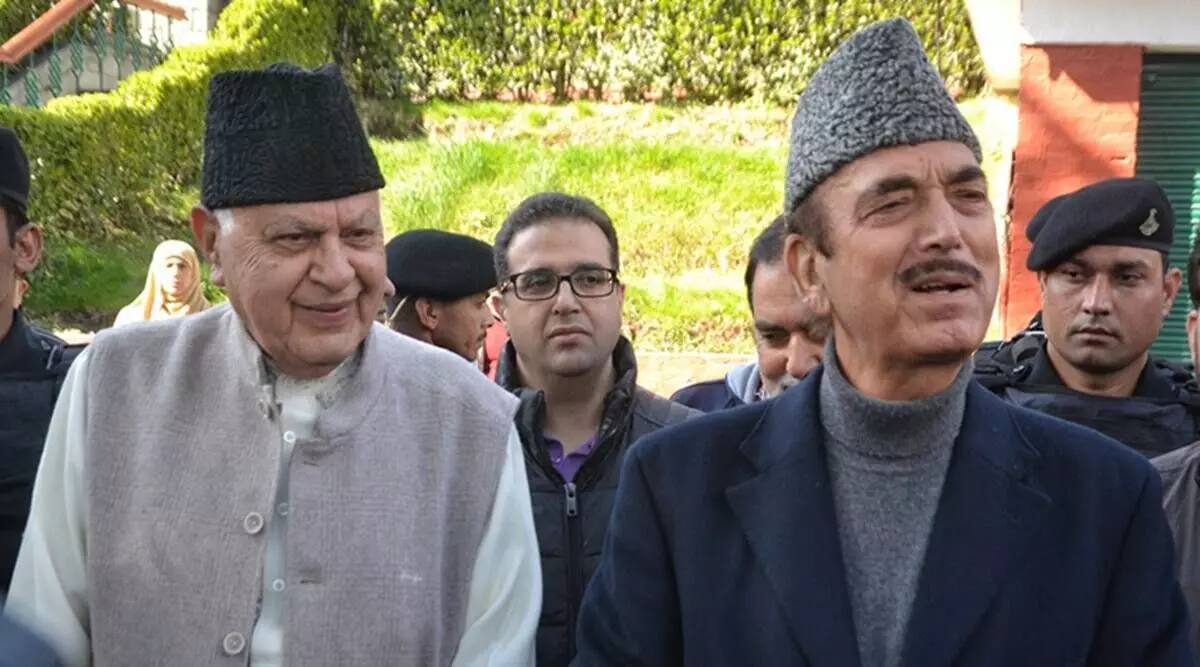
Kashmir being further estranged
text_fieldsThe non-BJP mainstream opposition parties of Jammu-Kashmir have again come to the picture with a vow that they would resume efforts to restore the special status of the state which the central government annulled on the 5 August last year. Amid speculations during the days preceding the Centre's step, that the Centre was likely to annul the provision in Articles 370 and 35A of the constitution, prominent political parties of the state had met at the Gupkar Road residence of former chief minister Farooq Abdulla and declared that they would not allow the abolition of special status of Kashmir. The six political parties whose leaders met the other day under the chairmanship of Farooq Abdulla, reaffirmed the previous decision. Among the leaders who were – and almost all non-BJP party eaders of Kashmir were – incarcerated for nearly a year, some including Farooq Abdulla and his son Omar Abdulla have been released since.
The leaders of Kashmir's major political parties were put in jail or under house arrest immediately after the special status was withdrawn, on the justification that they would influence the people and sway public opinion. Later, when some of them were released, that was done on a condition that they should not indulge in such public interventions. Some recent developments have been counted as the successful outcome of this action by the Centre such as: the initial silence observed by Farooq and Omar, the recent declaration by Omar Abdulla that they would abstain from election until the full statehood of Kashmir was restored (notably, not reinstatement of Art 370), the step of Shah Faesal who had resigned from IAS and formed a new political party claiming to replace all others, declaring that he quit politics and may return to IAS. It is amidst these developments that the six parties including National Conference, People Democratic Party (PDP) and Congress have come together with a second Gupkar declaration, raising the demand to restore Article 370. For the peace-loving people of Jammu-Kashmir, this is a time as much of test and as of torment. Therefore, Gupkar-II declares that they will work jointly to restore the special status of Jammu-Kashmir, which was promised by the constitution and periodically by national leaders. They have also made it clear that they will stand together in defence against any attack on or threat to the identity of Jammu-Kashmir, its autonomy and special status.
There is nothing unnatural about the Gupkar declaration, given that it is neither conceivable nor feasible for the political groupings of Jammu-Kashmir to make a political switch to sacrificing the special status. The mainstream movements there are those who have rejected the secessionist demands of joining Pakistan or full independent. But that is not the case with the special status and the self-determination which every Kashmiri holds dear as his birth right. The identity declaration of 'Kashmiriat' encompasses not only the distinct culture and traditions of Kashmir, but also the right to maintain them; thus, any one who forsakes it is treated as the lackeys of Delhi (the Centre) and renegades of Kashmir.
However, the seats of power in New Delhi seem to make no distinction between the professedly anti-India secessionists and champions of staying with India while asking for self-determination. Add to it the fact that the Modi government has no inhibition in granting similar special status to Nagaland, which thus means that the Modi regime sees the Kashmiri as equal to a mere political issue or if more than that, as a racial one. That the BJP views Kashmir's mainstream political parties as no different from secessionist leaders, is amply illustrated by events from their arrests in last August to the labelling of the recent second Gupkar declaration as pro-Pak. In a way, this is the worst folly committed by the central government since the annulment of Art 370.
Both the prime minister and home minister had declared that with the withdrawal of Kashmir's special status, a new Kashmir would be born with full statehood and an elected government. But what the prime minister stated in his Independence Day speech was that due to constituency delimitation and related issues, that will get delayed to next year. Other than bringing Kashmir under military control and continuing to clamp down on the terrorists and those suspected to be terrorists, the central government does not seem to have any clue about how to resume the process for peace and democracy; its actions so far vouch for this.
With secessionist militants beginning to attack BJP workers, the government has arranged special protection for them in places including hotels. The party rank and file who are quite disappointed with this situation went to the extent of holding sit-in protests. Although BJP general secretary Ram Madhav, who is in charge of Kashmir affairs, arrived in Srinagar the other day, he was not able to pacify the party workers. It is amidst this that the unyielding policy declaration has come from the main political parties. Regardless of the outcome of that, the lesson to be derived from the highly elastic politics of the Valley is that even while holding the Kashmiri soil tight under its military boots, the Modi government still has a long way to go before winning the hearts and minds of the region.























